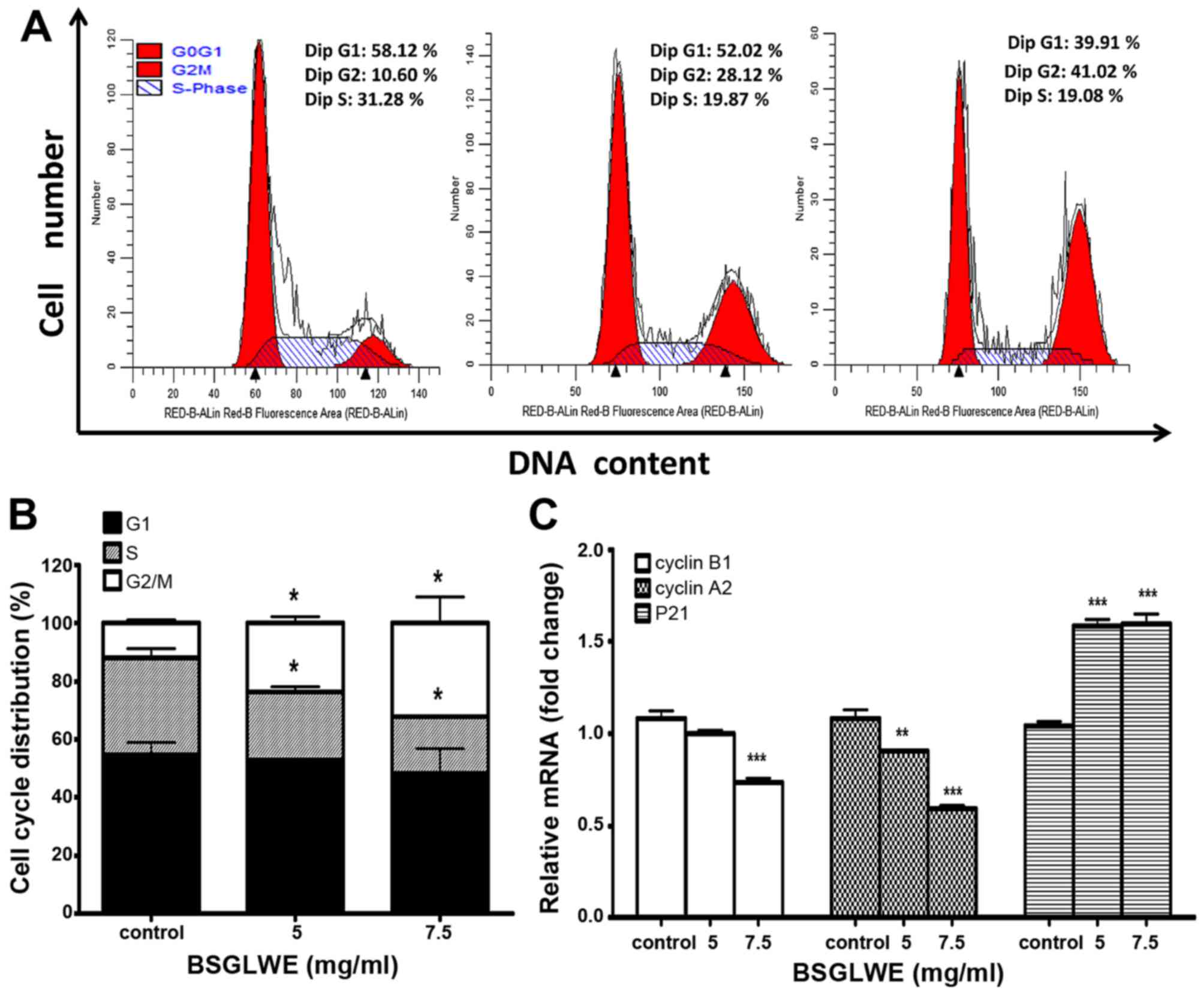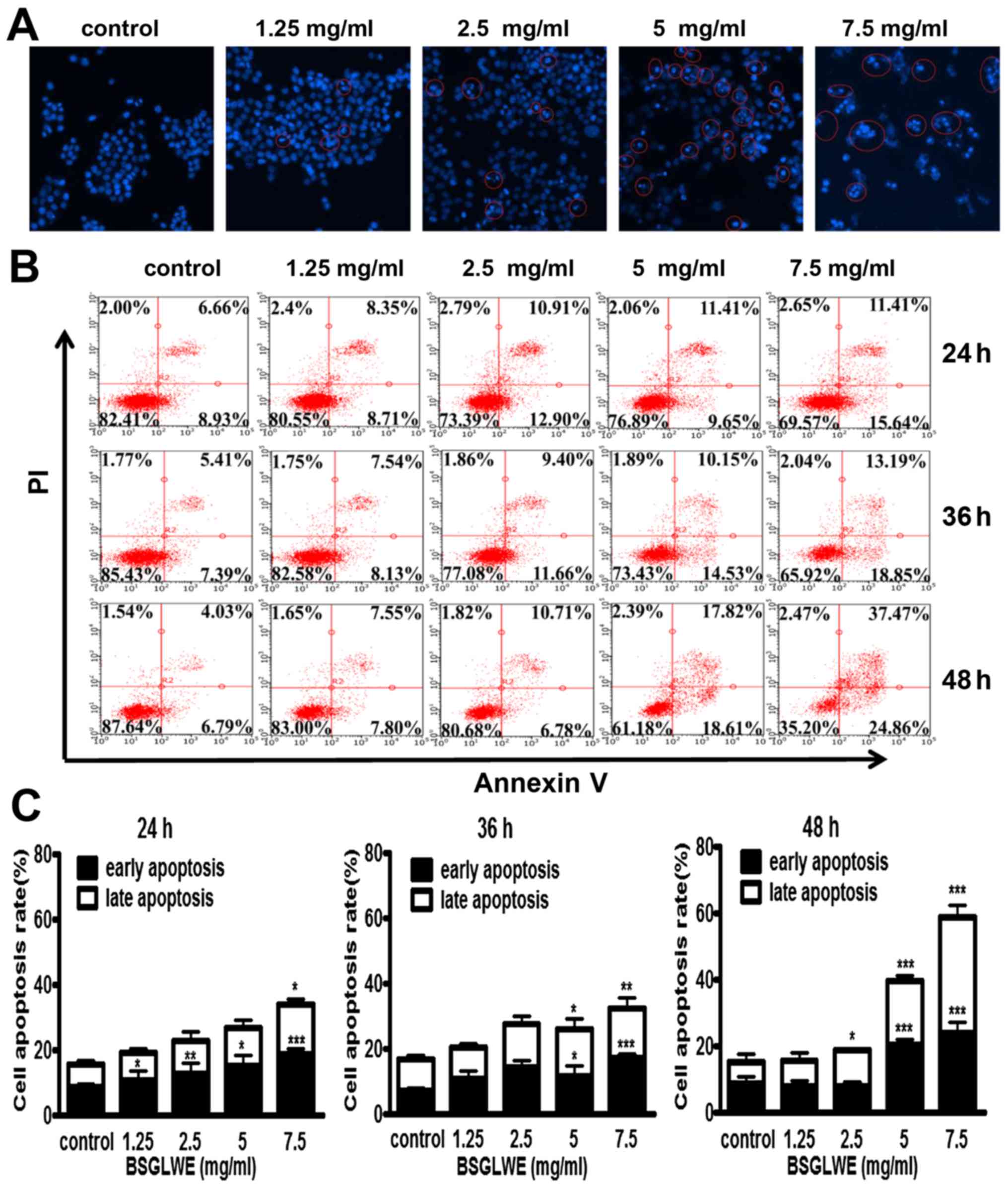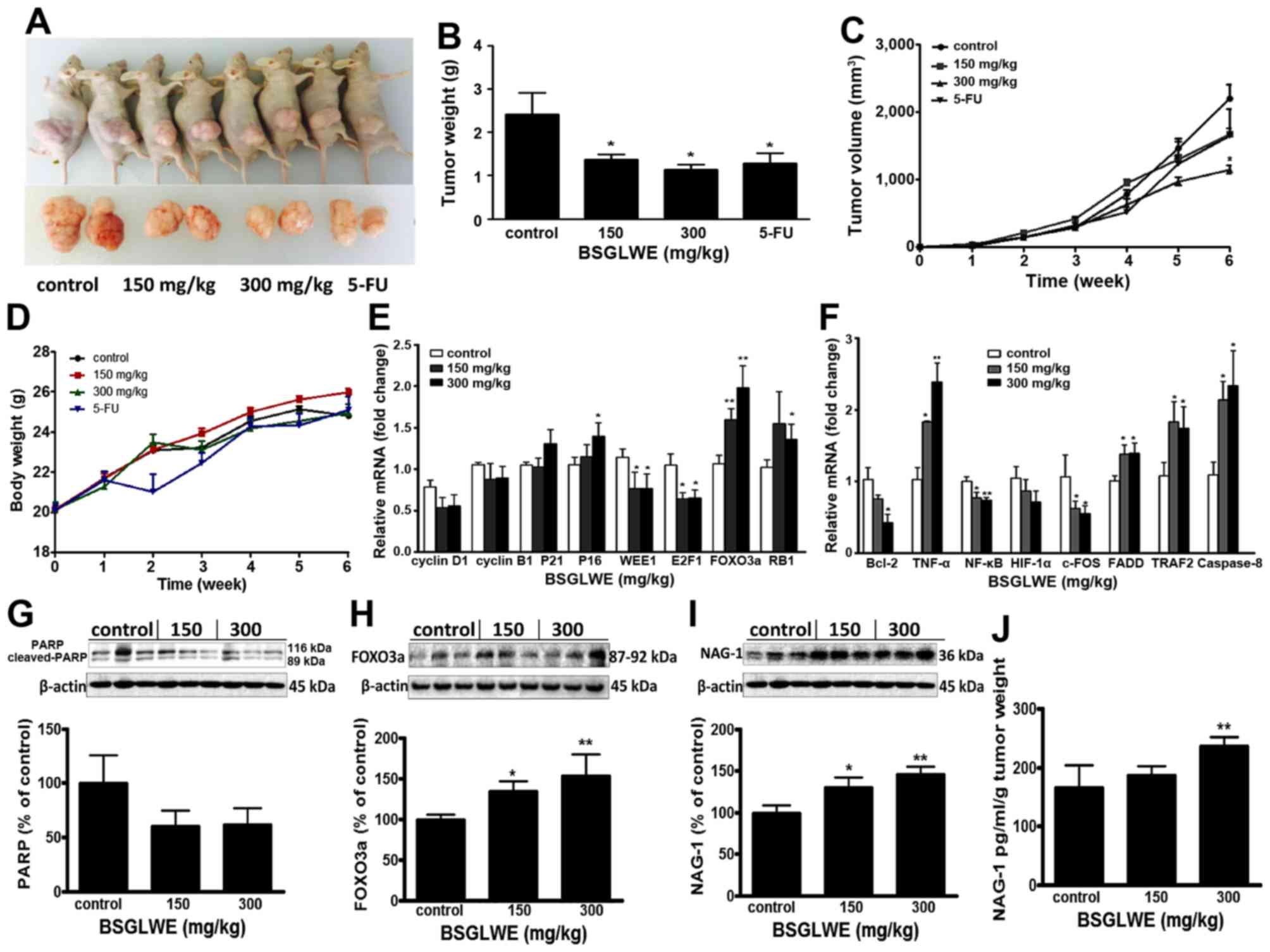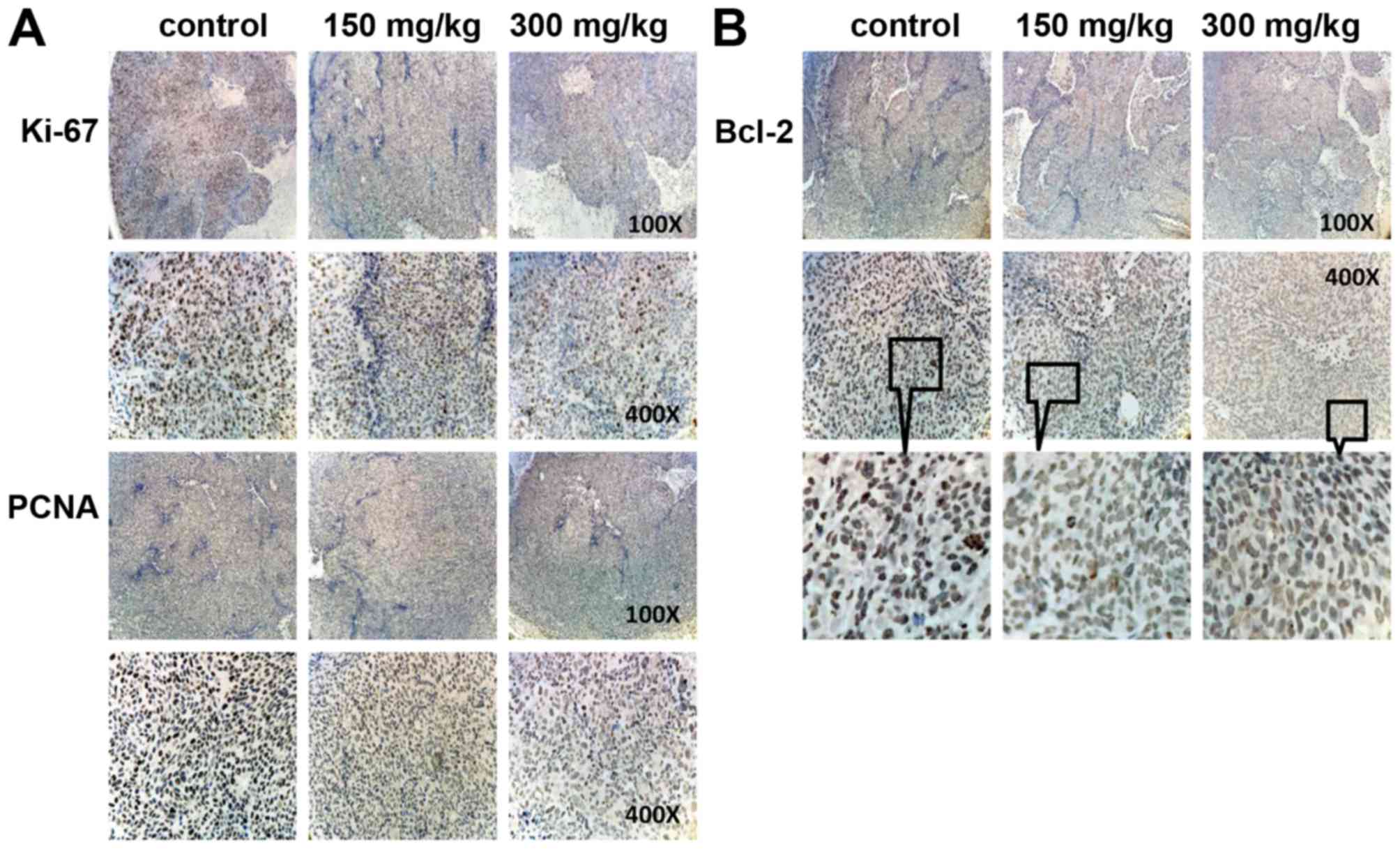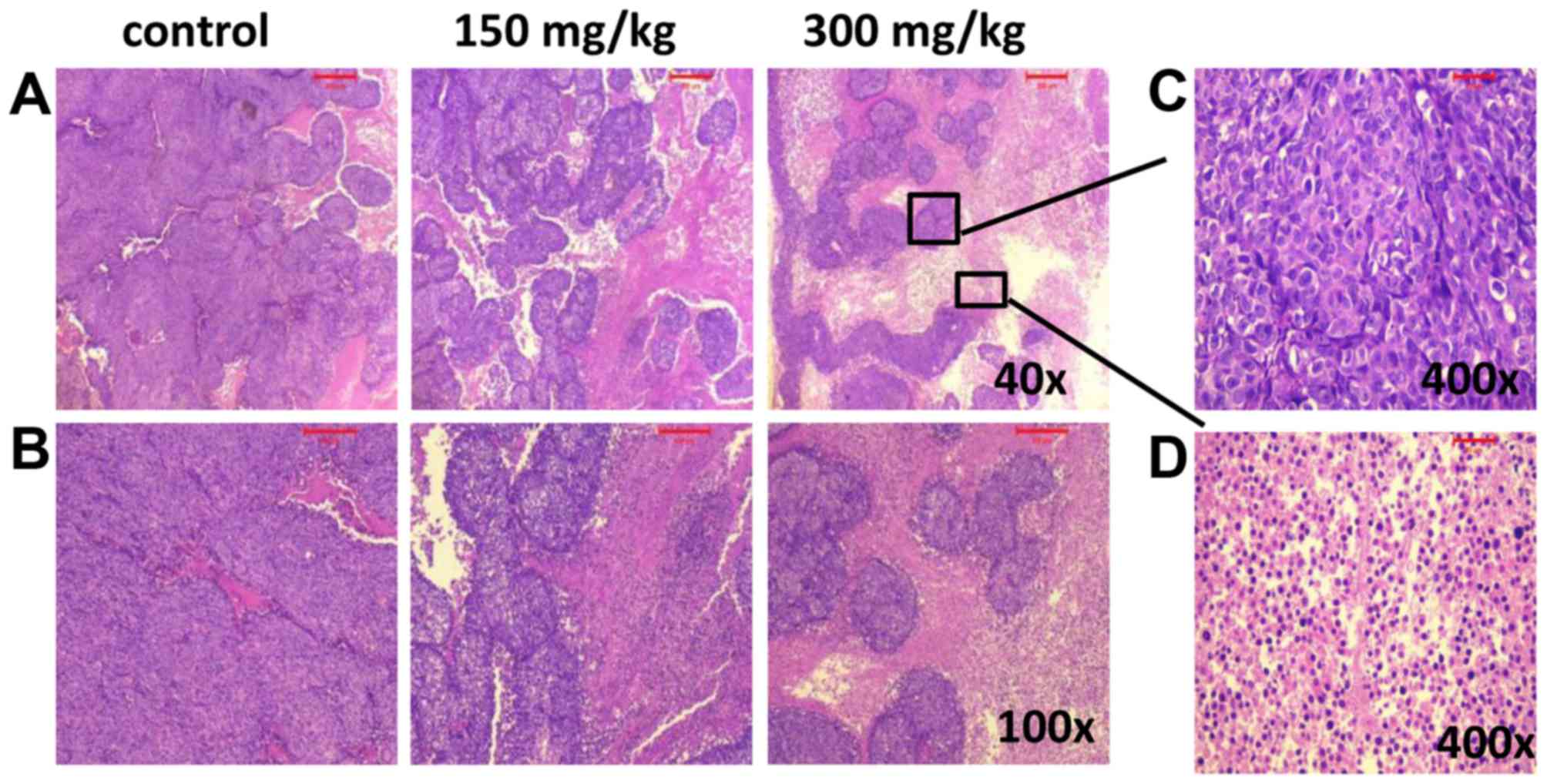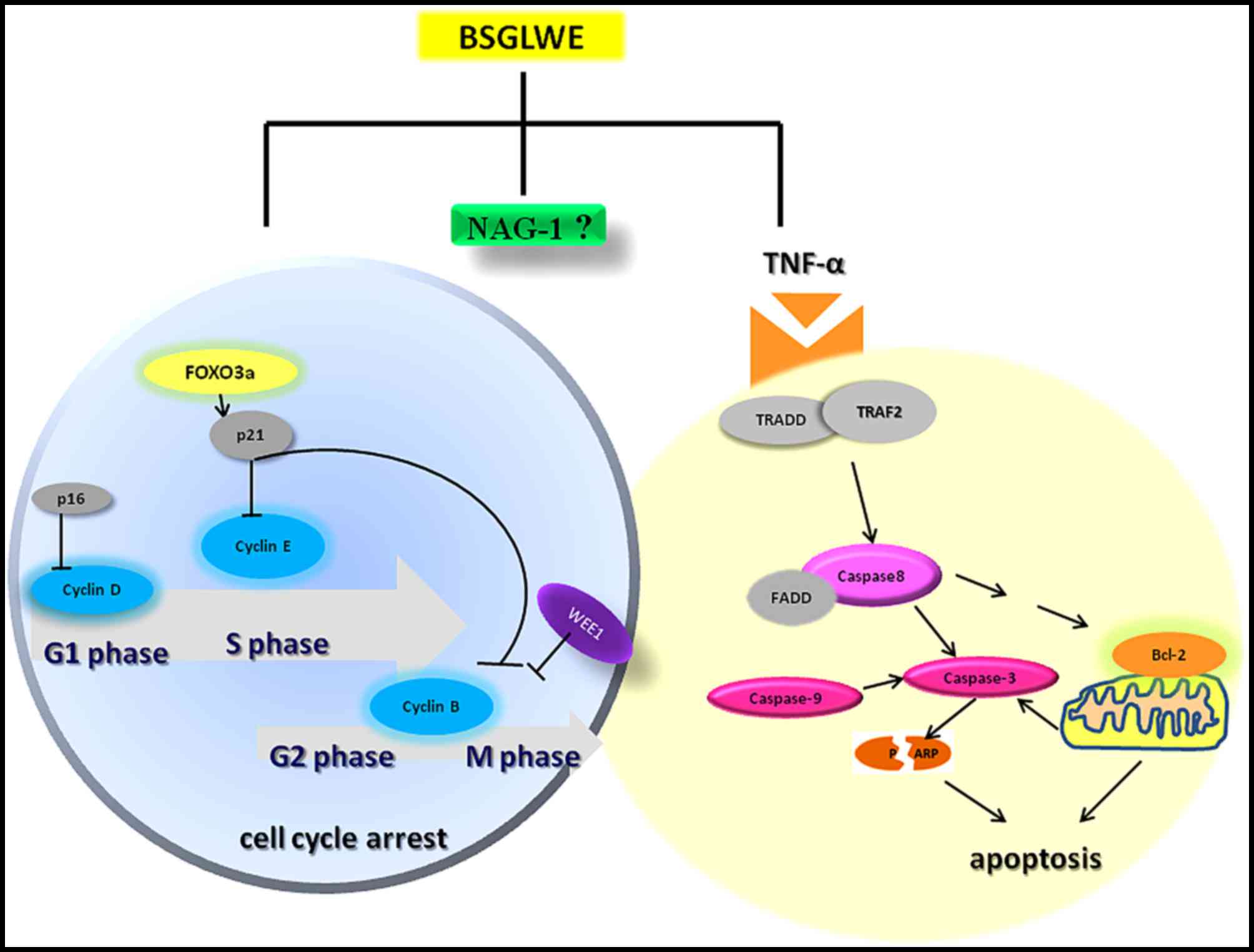|
1
|
Arnold M, Sierra MS, Laversanne M,
Soerjomataram I, Jemal A and Bray F: Global patterns and trends in
colorectal cancer incidence and mortality. Gut. 66:683–691. 2017.
View Article : Google Scholar
|
|
2
|
Brenner H, Kloor M and Pox CP: Colorectal
cancer. Lancet. 383:1490–1502. 2014. View Article : Google Scholar
|
|
3
|
Aisha AFA, Abu-Salah KM, Ismail Z and
Majid AMSA: in vitro and in vivo anti-colon cancer effects of
Garcinia mangostana xanthones extract. BMC Complement Altern Med.
12:1042012. View Article : Google Scholar : PubMed/NCBI
|
|
4
|
Saud SM, Li W, Morris NL, Matter MS,
Colburn NH, Kim YS and Young MR: Resveratrol prevents tumorigenesis
in mouse model of Kras activated sporadic colorectal cancer by
suppressing oncogenic Kras expression. Carcinogenesis.
35:2778–2786. 2014. View Article : Google Scholar : PubMed/NCBI
|
|
5
|
Afrin S, Giampieri F, Gasparrini M,
Forbes-Hernandez TY, Varela-López A, Quiles JL, Mezzetti B and
Battino M: Chemopreventive and therapeutic effects of edible
berries: a focus on colon cancer prevention and treatment.
Molecules. 21:1692016. View Article : Google Scholar : PubMed/NCBI
|
|
6
|
Shehzad A, Wahid F and Lee YS: Curcumin in
cancer chemo-prevention: Molecular targets, pharmacokinetics,
bioavailability, and clinical trials. Arch Pharm (Weinheim).
343:489–499. 2010. View Article : Google Scholar
|
|
7
|
Dan X, Liu W, Wong JH and Ng TB: A
ribonuclease isolated from wild Ganoderma lucidum suppressed
autophagy and triggered apoptosis in colorectal cancer cells. Front
Pharmacol. 7:2172016. View Article : Google Scholar : PubMed/NCBI
|
|
8
|
Bishop KS, Kao CH, Xu Y, Glucina MP,
Paterson RR and Ferguson LR: From 2000 years of Ganoderma lucidum
to recent developments in nutraceuticals. Phytochemistry.
114:56–65. 2015. View Article : Google Scholar : PubMed/NCBI
|
|
9
|
Boh B, Berovic M, Zhang J and Zhi-Bin L:
Ganoderma lucidum and its pharmaceutically active compounds.
Biotechnol Annu Rev. 13:265–301. 2007. View Article : Google Scholar : PubMed/NCBI
|
|
10
|
Wasser SP: Reishi or Ling Zhi (Ganoderma
lucidum). Encyclopedia of Dietary Supplements. Coates PM, Blackman
MR, Cragg GM, Levine M, Moss J and White JD: Marcel Dekker; New
York: pp. 603–622. 2005
|
|
11
|
Li A, Shuai X, Jia Z, Li H, Liang X, Su D
and Guo W: Ganoderma lucidum polysaccharide extract inhibits
hepatocellular carcinoma growth by downregulating regulatory T
cells accumulation and function by inducing microRNA-125b. J Transl
Med. 13:1002015. View Article : Google Scholar : PubMed/NCBI
|
|
12
|
Loganathan J, Jiang J, Smith A, Jedinak A,
Thyagarajan-Sahu A, Sandusky GE, Nakshatri H and Sliva D: The
mushroom Ganoderma lucidum suppresses breast-to-lung cancer
metastasis through the inhibition of pro-invasive genes. Int J
Oncol. 44:2009–2015. 2014.PubMed/NCBI
|
|
13
|
Shang D, Li Y, Wang C, Wang X, Yu Z and Fu
X: A novel polysaccharide from Se-enriched Ganoderma lucidum
induces apoptosis of human breast cancer cells. Oncol Rep.
25:267–272. 2011.
|
|
14
|
Yang G, Yang L, Zhuang Y, Qian X and Shen
Y: Ganoderma lucidum polysaccharide exerts anti-tumor activity via
MAPK pathways in HL-60 acute leukemia cells. J Recept Signal
Transduct Res. 36:6–13. 2016. View Article : Google Scholar
|
|
15
|
Hsieh TC and Wu JM: Suppression of
proliferation and oxidative stress by extracts of Ganoderma lucidum
in the ovarian cancer cell line OVCAR-3. Int J Mol Med.
28:1065–1069. 2011.PubMed/NCBI
|
|
16
|
Cao QZ and Lin Z-B: Ganoderma lucidum
polysaccharides peptide inhibits the growth of vascular endothelial
cell and the induction of VEGF in human lung cancer cell. Life Sci.
78:1457–1463. 2006. View Article : Google Scholar
|
|
17
|
Sun LX, Li WD, Lin ZB, Duan XS, Li XF,
Yang N, Lan TF, Li M, Sun Y, Yu M, et al: Protection against lung
cancer patient plasma-induced lymphocyte suppression by Ganoderma
lucidum polysaccharides. Cell Physiol Biochem. 33:289–299. 2014.
View Article : Google Scholar : PubMed/NCBI
|
|
18
|
Liang Z, Yi Y, Guo Y, Wang R, Hu Q and
Xiong X: Chemical characterization and antitumor activities of
polysaccharide extracted from Ganoderma lucidum. Int J Mol Sci.
15:9103–9116. 2014. View Article : Google Scholar : PubMed/NCBI
|
|
19
|
Ferreira IC, Heleno SA, Reis FS, Stojkovic
D, Queiroz MJ, Vasconcelos MH and Sokovic M: Chemical features of
Ganoderma polysaccharides with antioxidant, antitumor and
antimicrobial activities. Phytochemistry. 114:38–55. 2015.
View Article : Google Scholar
|
|
20
|
Guo L, Xie J, Ruan Y, Zhou L, Zhu H, Yun
X, Jiang Y, Lü L, Chen K, Min Z, et al: Characterization and
immunostimulatory activity of a polysaccharide from the spores of
Ganoderma lucidum. Int Immunopharmacol. 9:1175–1182. 2009.
View Article : Google Scholar : PubMed/NCBI
|
|
21
|
Huang XL, Hui-Qin WU, Fang H and Lin XS:
Analysis of polysaccharide from broken cellular wall and unbroken
spore of Ganoderma lucidum. Chin Tradit Herbal Drugs. 37:813–816.
2006.
|
|
22
|
Zhao J, Qiu C, Li J, Fan J and Chen K:
inhibitive effect of selenium-enriching wall-broken Ganoderma
lucidum spore powder on HepG2 cells. Life Sci. 79:11292006.
|
|
23
|
Baek SJ, Kim KS, Nixon JB, Wilson LC and
Eling TE: Cyclooxygenase inhibitors regulate the expression of a
TGF-beta superfamily member that has proapoptotic and
antitumorigenic activities. Mol Pharmacol. 59:901–908.
2001.PubMed/NCBI
|
|
24
|
Wang X, Baek SJ and Eling TE: The diverse
roles of nonsteroidal anti-inflammatory drug activated gene
(NAG-1/GDF15) in cancer. Biochem Pharmacol. 85:597–606. 2013.
View Article : Google Scholar :
|
|
25
|
Kang SU, Shin YS, Hwang HS, Baek SJ, Lee
SH and Kim CH: Tolfenamic acid induces apoptosis and growth
inhibition in head and neck cancer: Involvement of NAG-1
expression. PLoS One. 7:e349882012. View Article : Google Scholar : PubMed/NCBI
|
|
26
|
Wang X, Chrysovergis K, Bienstock RJ, Shim
M and Eling TE: The H6D variant of NAG-1/GDF15 inhibits prostate
xenograft growth in vivo. Prostate. 72:677–689. 2012. View Article : Google Scholar
|
|
27
|
Arafat K, Iratni R, Takahashi T, Parekh K,
Al Dhaheri Y, Adrian TE and Attoub S: Inhibitory effects of
salinomycin on cell survival, colony growth, migration, and
invasion of human non-small cell lung cancer A549 and LNM35:
Involvement of NAG-1. PLoS One. 8:e669312013. View Article : Google Scholar : PubMed/NCBI
|
|
28
|
Liggett JL, Zhang X, Eling TE and Baek SJ:
Anti-tumor activity of non-steroidal anti-inflammatory drugs:
Cyclooxygenase-independent targets. Cancer Lett. 346:217–224. 2014.
View Article : Google Scholar : PubMed/NCBI
|
|
29
|
Piyanuch R, Sukhthankar M, Wandee G and
Baek SJ: Berberine, a natural isoquinoline alkaloid, induces NAG-1
and ATF3 expression in human colorectal cancer cells. Cancer Lett.
258:230–240. 2007. View Article : Google Scholar : PubMed/NCBI
|
|
30
|
Guertin AD, Martin MM, Roberts B, Hurd M,
Qu X, Miselis NR, Liu Y, Li J, Feldman I, Benita Y, et al: unique
functions of CHK1 and WEE1 underlie synergistic anti-tumor activity
upon pharmacologic inhibition. Cancer Cell Int. 12:452012.
View Article : Google Scholar : PubMed/NCBI
|
|
31
|
Mir SE, De Witt Hamer PC, Krawczyk PM,
Balaj L, Claes A, Niers JM, Van Tilborg AA, Zwinderman AH, Geerts
D, Kaspers GJ, et al: In silico analysis of kinase expression
identifies WEE1 as a gatekeeper against mitotic catastrophe in
glioblastoma. Cancer Cell. 18:244–257. 2010. View Article : Google Scholar : PubMed/NCBI
|
|
32
|
Vitale I, Galluzzi L, Castedo M and
Kroemer G: Mitotic catastrophe: A mechanism for avoiding genomic
instability. Nat Rev Mol Cell Biol. 12:385–392. 2011. View Article : Google Scholar : PubMed/NCBI
|
|
33
|
Ogawa H, Ishiguro K, Gaubatz S, Livingston
DM and Nakatani Y: A complex with chromatin modifiers that occupies
E2F- and Myc-responsive genes in G0 cells. Science. 296:1132–1136.
2002. View Article : Google Scholar : PubMed/NCBI
|
|
34
|
Burgering BM and Medema RH: Decisions on
life and death: FOXO Forkhead transcription factors are in command
when PKB/Akt is off duty. J Leukoc Biol. 73:689–701. 2003.
View Article : Google Scholar : PubMed/NCBI
|
|
35
|
Li WJ, Chen Y, Nie SP, Xie MY, He M, Zhang
SS and Zhu KX: Ganoderma atrum polysaccharide induces anti-tumor
activity via the mitochondrial apoptotic pathway related to
activation of host immune response. J Cell Biochem. 112:860–871.
2011. View Article : Google Scholar : PubMed/NCBI
|
|
36
|
Xu Z, Chen X, Zhong Z, Chen L and Wang Y:
Ganoderma lucidum polysaccharides: Immunomodulation and potential
anti-tumor activities. Am J Chin Med. 39:15–27. 2011. View Article : Google Scholar : PubMed/NCBI
|
|
37
|
Wu QP, Xie YZ, Li SZ, La Pierre DP, Deng
Z, Chen Q, Li C, Zhang Z, Guo J, Wong C-KA, et al: Tumour cell
adhesion and integrin expression affected by Ganoderma lucidum.
Enzyme Microb Technol. 40:32–41. 2006. View Article : Google Scholar
|
|
38
|
Sun Z, Huang K, Fu X, Zhou Z, Cui Y and Li
H: A chemically sulfated polysaccharide derived from Ganoderma
lucidum induces mitochondrial-mediated apoptosis in human
osteosarcoma MG63 cells. Tumour Biol. 35:9919–9926. 2014.
View Article : Google Scholar : PubMed/NCBI
|
|
39
|
Li WD, Zhang BD, Wei R, Liu JH and Lin ZB:
Reversal effect of Ganoderma lucidum polysaccharide on multidrug
resistance in K562/ADM cell line. Acta Pharmacol Sin. 29:620–627.
2008. View Article : Google Scholar : PubMed/NCBI
|
|
40
|
Hanahan D and Weinberg RA: Hallmarks of
cancer: The next generation. Cell. 144:646–674. 2011. View Article : Google Scholar : PubMed/NCBI
|
|
41
|
Borgs L, Beukelaers P, Vandenbosch R,
Belachew S, Nguyen L and Malgrange B: Cell 'circadian' cycle: New
role for mammalian core clock genes. Cell Cycle. 8:832–837. 2009.
View Article : Google Scholar : PubMed/NCBI
|
|
42
|
Lee B, Sandhu S and McArthur G: Cell cycle
control as a promising target in melanoma. Curr Opin Oncol.
27:141–150. 2015. View Article : Google Scholar : PubMed/NCBI
|
|
43
|
Hochegger H, Takeda S and Hunt T:
Cyclin-dependent kinases and cell-cycle transitions: Does one fit
all? Nat Rev Mol Cell Biol. 9:910–916. 2008. View Article : Google Scholar : PubMed/NCBI
|
|
44
|
Abbas T and Dutta A: p21 in cancer:
Intricate networks and multiple activities. Nat Rev Cancer.
9:400–414. 2009. View Article : Google Scholar : PubMed/NCBI
|
|
45
|
Lim S and Kaldis P: Cdks, cyclins and
CKIs: Roles beyond cell cycle regulation. Development.
140:3079–3093. 2013. View Article : Google Scholar : PubMed/NCBI
|
|
46
|
Niculescu AB III, Chen X, Smeets M, Hengst
L, Prives C and Reed SI: Effects of p21 (Cip1/Waf1) at both the
G1/S and the G2/M cell cycle transitions: pRb is a critical
determinant in blocking DNA replication and in preventing
endoreduplication. Mol Cell Biol. 18:629–643. 1998. View Article : Google Scholar : PubMed/NCBI
|
|
47
|
Zhao S, Ye G, Fu G, Cheng JX, Yang BB and
Peng C: Ganoderma lucidum exerts anti-tumor effects on ovarian
cancer cells and enhances their sensitivity to cisplatin. Int J
Oncol. 38:1319–1327. 2011.PubMed/NCBI
|
|
48
|
Wang J, Zhang L, Yu Y and Cheung PC:
Enhancement of antitumor activities in sulfated and
carboxymethylated polysaccharides of Ganoderma lucidum. J Agric
Food Chem. 57:10565–10572. 2009. View Article : Google Scholar : PubMed/NCBI
|
|
49
|
Soták M, Sumová A and Pácha J: Cross-talk
between the circadian clock and the cell cycle in cancer. Ann Med.
46:221–232. 2014. View Article : Google Scholar : PubMed/NCBI
|
|
50
|
Williams RT, Barnhill LM, Kuo HH, Lin WD,
Batova A, Yu AL and Diccianni MB: Chimeras of p14ARF and 16:
Functional hybrids with the ability to arrest growth. PLoS One.
9:e882192014. View Article : Google Scholar
|
|
51
|
Dyson N: The regulation of E2F by
pRB-family proteins. Genes Dev. 12:2245–2262. 1998. View Article : Google Scholar : PubMed/NCBI
|
|
52
|
Fu Z and Tindall DJ: FOXOs, cancer and
regulation of apoptosis. Oncogene. 27:2312–2319. 2008. View Article : Google Scholar : PubMed/NCBI
|
|
53
|
Nho RS and Hergert P: FoxO3a and disease
progression. World J Biol Chem. 5:346–354. 2014. View Article : Google Scholar : PubMed/NCBI
|
|
54
|
Dey P, Ström A and Gustafsson JÅ: Estrogen
receptor β upregulates FOXO3a and causes induction of apoptosis
through PUMA in prostate cancer. Oncogene. 33:4213–4225. 2014.
View Article : Google Scholar
|
|
55
|
Hoesel B and Schmid JA: The complexity of
NF-κB signaling in inflammation and cancer. Mol Cancer. 12:862013.
View Article : Google Scholar
|
|
56
|
Chung HY, Lee EK, Choi YJ, Kim JM, Kim DH,
Zou Y, Kim CH, Lee J, Kim HS, Kim ND, et al: Molecular inflammation
as an underlying mechanism of the aging process and age-related
diseases. J Dent Res. 90:830–840. 2011. View Article : Google Scholar : PubMed/NCBI
|
|
57
|
Fluckiger A, Dumont A, Derangère V, Rébé
C, de Rosny C, Causse S, Thomas C, Apetoh L, Hichami A,
Ghiringhelli F, et al: Inhibition of colon cancer growth by
docosahexaenoic acid involves autocrine production of TNFα.
Oncogene. 35:4611–4622. 2016. View Article : Google Scholar : PubMed/NCBI
|
|
58
|
Lee HY, Youn SW, Kim JY, Park KW, Hwang
CI, Park WY, Oh BH, Park YB, Walsh K, Seo JS, et al: FOXO3a turns
the tumor necrosis factor receptor signaling towards apoptosis
through reciprocal regulation of c-Jun N-terminal kinase and
NF-kappaB. Arterioscler Thromb Vasc Biol. 28:112–120. 2008.
View Article : Google Scholar
|
|
59
|
Dasgupta A, Nomura M, Shuck R and Yustein
J: Cancer's Achilles' Heel: Apoptosis and Necroptosis to the
Rescue. Int J Mol Sci. 18:1–20. 2016. View Article : Google Scholar
|
|
60
|
Shi K-G and Qing L-H: The follow-up
observation assessment of medium and late phases cancer treated by
Chinese Ganoderma lucidum essence (CGLE). Ganoderma: Genetics,
Chemistry, Pharmacology and Therapeutics - Proceedings of
International Symposium on Ganoderma Research; 2002, http://cstm.cnki.net/stmt/TitleBrowse/KnowledgeNet/ZGYS200210001028?db=STMi8515.
|
|
61
|
Zhao H, Zhang Q, Zhao L, Huang X, Wang J
and Kang X: Spore powder of Ganoderma lucidum improves
cancer-related fatigue in breast cancer patients undergoing
endocrine therapy: A pilot clinical trial. Evid Based Complement
Alternat Med. 2012:8096142012. View Article : Google Scholar
|
|
62
|
Suprasert P, Apichartpiyakul C, Sakonwasun
C, Nitisuwanraksa P and Phuackchantuck R: Clinical characteristics
of gynecologic cancer patients who respond to salvage treatment
with Lingzhi. Asian Pac J Cancer Prev. 15:4193–4196. 2014.
View Article : Google Scholar : PubMed/NCBI
|
|
63
|
Chen D, Yu J and Zhang L: Necroptosis: An
alternative cell death program defending against cancer. Biochimica
et Biophysica Acta. 1865:228–236. 2016.PubMed/NCBI
|
|
64
|
Feoktistova M, Wallberg F, Tenev T,
Geserick P, Leverkus M and Meier P: Techniques to distinguish
apoptosis from necroptosis. Cold Spring Harb Protoc.
2016:pdb.top070375. 2016. View Article : Google Scholar : PubMed/NCBI
|
|
65
|
Zong WX and Thompson CB: Necrotic death as
a cell fate. Genes Dev. 20:1–15. 2006. View Article : Google Scholar : PubMed/NCBI
|
|
66
|
Kanduc D, Mittelman A, Serpico R,
Sinigaglia E, Sinha AA, Natale C, Santacroce R, Di Corcia MG,
Lucchese A, Dini L, et al: Cell death: Apoptosis versus necrosis
(Review). Int J Oncol. 21:165–170. 2002.PubMed/NCBI
|
|
67
|
Diederich M and Cerella C: Non-canonical
programmed cell death mechanisms triggered by natural compounds.
Semin Cancer Biol. 40–41:4–34. 2016. View Article : Google Scholar
|
|
68
|
Gali-Muhtasib H, Hmadi R, Kareh M, Tohme R
and Darwiche N: Cell death mechanisms of plant-derived anticancer
drugs: Beyond apoptosis. Apoptosis. 20:1531–1562. 2015. View Article : Google Scholar : PubMed/NCBI
|
|
69
|
Wilson TR, Johnston PG and Longley DB:
Anti-apoptotic mechanisms of drug resistance in cancer. Curr Cancer
Drug Targets. 9:307–319. 2009. View Article : Google Scholar : PubMed/NCBI
|
|
70
|
Kim MS, Lee SY, Cho WH, Song WS, Koh JS,
Lee JA, Yoo JY and Jeon DG: Tumor necrosis rate adjusted by tumor
volume change is a better predictor of survival of localized
osteosarcoma patients. Ann Surg Oncol. 15:906–914. 2008. View Article : Google Scholar
|
|
71
|
Fearon KC, Glass DJ and Guttridge DC:
Cancer cachexia: Mediators, signaling, and metabolic pathways. Cell
Metab. 16:153–166. 2012. View Article : Google Scholar : PubMed/NCBI
|
|
72
|
Zhuang SR, Chen SL, Tsai JH, Huang CC, Wu
TC, Liu WS, Tseng HC, Lee HS, Huang MC, Shane GT, et al: Effect of
citronellol and the Chinese medical herb complex on cellular
immunity of cancer patients receiving chemotherapy/radiotherapy.
Phytother Res. 23:785–790. 2009. View Article : Google Scholar : PubMed/NCBI
|
|
73
|
Jin X, Ruiz Beguerie J, Sze DM and Chan
GC: Ganoderma lucidum (Reishi mushroom) for cancer treatment.
Cochrane Database Syst Rev. 6:CD0077312012.
|
|
74
|
Khaled YS, Elkord E and Ammori BJ:
Macrophage inhibitory cytokine-1: A review of its pleiotropic
actions in cancer. Cancer Biomark. 11:183–190. 2012. View Article : Google Scholar : PubMed/NCBI
|
















